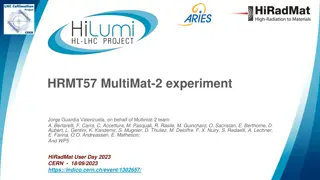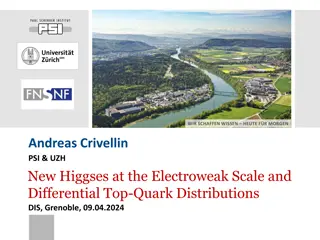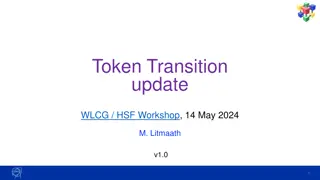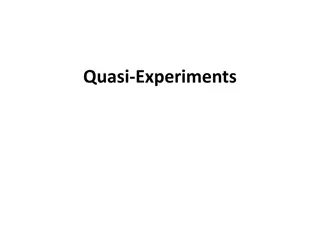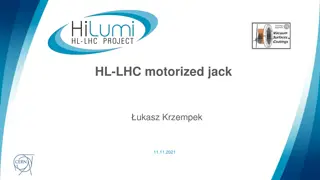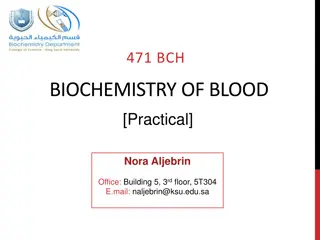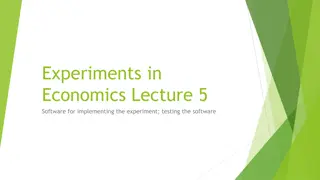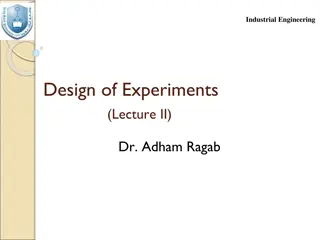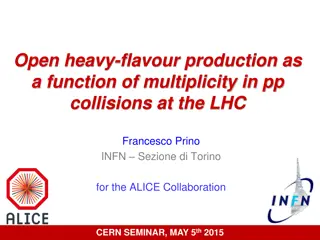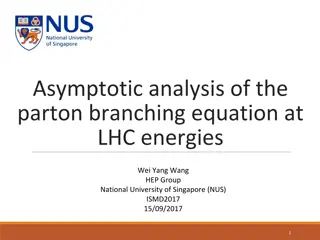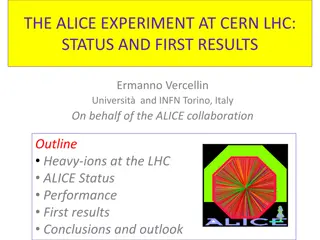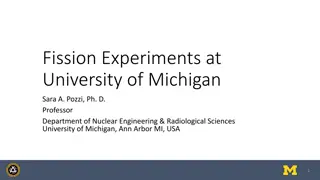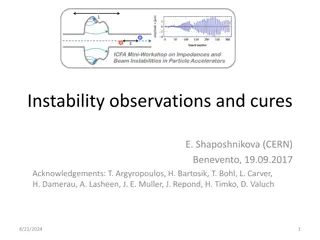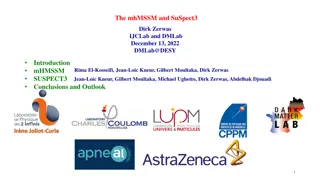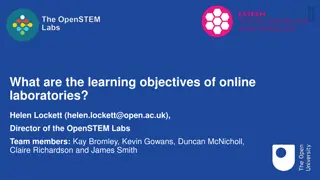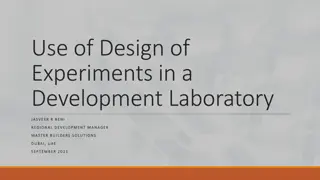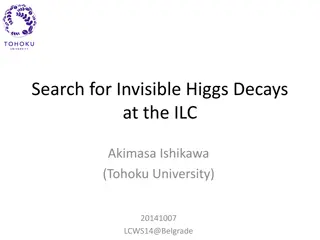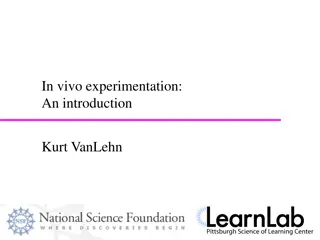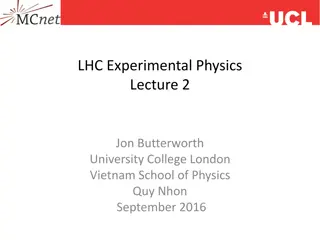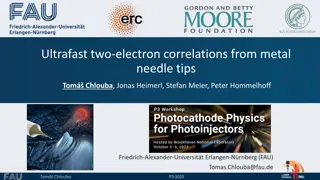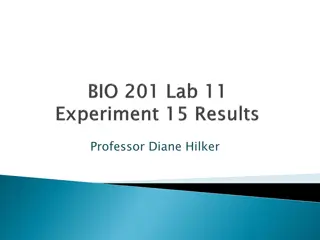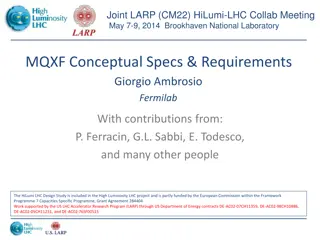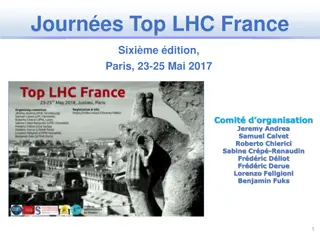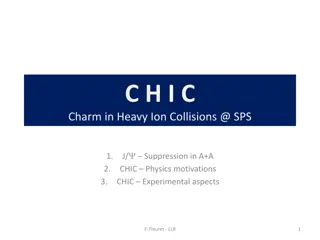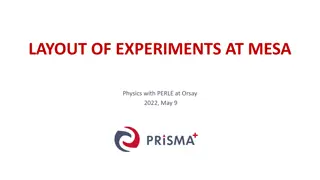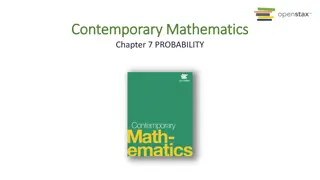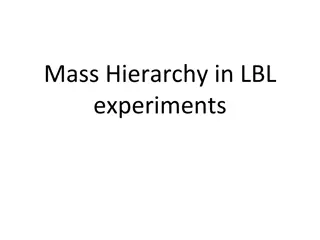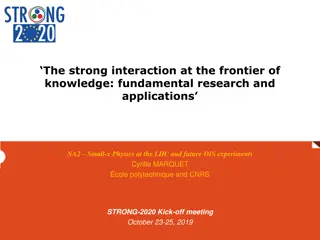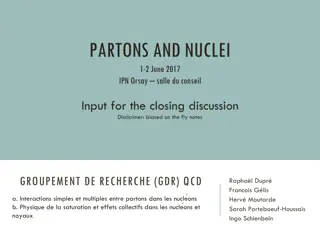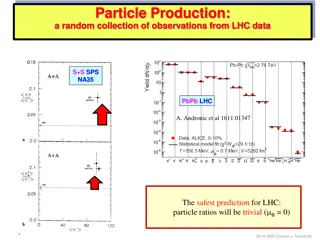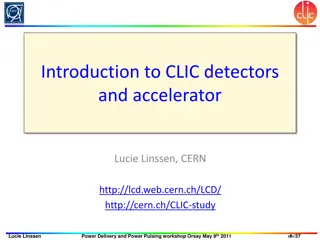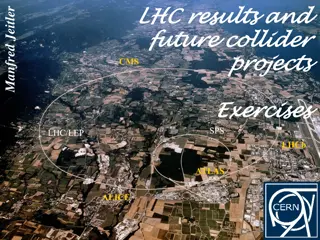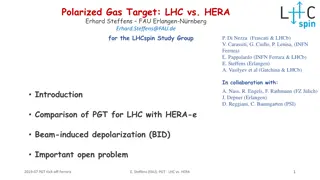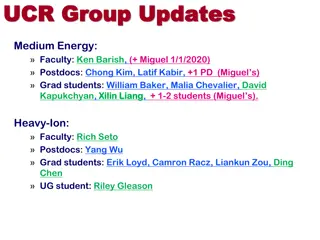Overview of ALICE Data Acquisition System Upgrade for LHC Run 3
ALICE is undergoing significant upgrades for LHC Run 3, including the implementation of the O2/FLP system. This upgrade will enhance data acquisition, processing, and storage capabilities. Key elements include new computing systems, software, and portfolio enhancements. The project overview outlines
1 views • 23 slides
Multimat-2 Experiment: Advancements in HL-LHC Collimator Technologies
The Multimat-2 experiment conducted by Jorge Guardia Valenzuela and the team at CERN focused on testing prototypes of HL-LHC collimators, including materials and coatings, to improve the robustness and performance under extreme conditions. The goals included deriving strength models, exploring failu
3 views • 13 slides
New Higgs Bosons and Physics Beyond the Standard Model
Discoveries of new Higgs bosons at the electroweak scale, hints for new scalars at 95 GeV and 151.5 GeV, investigations into the nature of the 151.5 GeV Higgs as a triplet, and analyses of top-quark distributions at the LHC hint at exciting possibilities for physics beyond the Standard Model. ATLAS
0 views • 21 slides
Update on Computing and IAM Service Developments in WLCG/HSF Workshop
Details about the update campaign for HTCondor CEs, APEL support for tokens, and IAM service developments presented at the WLCG/HSF Workshop on May 14, 2024. Highlights include HTCondor CE upgrades, APEL support discussions, and advancements in IAM services for LHC experiments.
2 views • 12 slides
London Homeless Coalition (LHC) Death Communication Protocol
In 2014, the Memorial Committee of the London Homeless Coalition (LHC) established the Death Communication Protocol to acknowledge, share, and address the loss of individuals experiencing homelessness. The protocol aims to inform partnering organizations of confirmed or unconfirmed deaths, support g
2 views • 12 slides
Quasi-Experiments in Research
Quasi-experiments are research studies that resemble experiments but do not involve random assignment of participants to treatment groups. This approach is taken when random assignment is challenging or when ethical considerations come into play. Unlike true experiments, quasi-experiments can provid
1 views • 15 slides
Design Analysis of HL-LHC Motorized Jack Components
This technical document provides detailed information on the design analysis of various components used in the HL-LHC motorized jack system. It includes boundary conditions, material specifications, strength requirements, and stress analysis of components such as push-pull rings, guide cylinders, RA
2 views • 7 slides
Biochemistry of Blood Practical Course Overview
This biochemistry of blood practical course involves various experiments focusing on blood components such as plasma, serum, proteins, enzymes, blood groups, hemoglobin, glucose levels, and more. The course outline includes detailed experiments, marking distribution, guidelines for writing scientifi
3 views • 6 slides
Optimizing Benefits Through Sorting in LHC Magnet Systems
LHC's experience highlights the significant advantages of sorting in magnet systems, such as safeguarding against losses in mechanical and dynamic apertures, minimizing beta-beating, and enhancing field quality. By controlling observable quantities like mechanical aperture, transfer function, and fi
0 views • 8 slides
Software Options for Implementing Economic Experiments
Explore various software tools like Z-tree, Visual Studio, and Python that can be used to implement and conduct economic experiments effectively. Learn about the benefits and trade-offs of different software options, and discover online platforms like O-tree and Z-tree unleashed for running experime
0 views • 17 slides
Introduction to Industrial Engineering Statistics and Experiments
Delve into the realm of Industrial Engineering through Statistics and Design of Experiments in this comprehensive lecture series by Dr. Adham Ragab. Explore the practical applications of statistics, differentiate between population and sample, calculate statistical variables, and understand the sign
0 views • 25 slides
Open Heavy-Flavour Production in pp Collisions at the LHC - Physics Seminar Overview
Physics seminar presentation by Francesco Prino on open heavy-flavour production as a function of multiplicity in pp collisions at the Large Hadron Collider (LHC). The talk covers the motivation behind studying heavy-flavour production mechanisms, data analysis techniques, results on the multiplicit
1 views • 65 slides
Insights into Parton Branching Equation at LHC Energies
Multiplicity distributions play a crucial role in understanding the cascade of quarks and gluons at the LHC energies, revealing underlying correlations in particle production. Popular models like Monte Carlo and statistical models are used to describe the charged particle multiplicity distributions.
1 views • 17 slides
Heavy-Ion Collisions at CERN LHC: ALICE Experiment Overview
Unveiling insights into heavy-ion collisions at CERN's Large Hadron Collider (LHC) through the ALICE experiment. Delving into the status, performance, and initial results, ALICE aims to characterize the medium formed during collisions. With a collaboration of around 1000 members from 31 countries an
0 views • 29 slides
Advanced Fission Experiments at University of Michigan
The University of Michigan, under the guidance of Dr. Sara A. Pozzi, conducts cutting-edge fission experiments leveraging organic scintillation detectors. These detectors offer advantages such as nanosecond-scale response times, energy proportionality, and scalability. The experiments focus on impro
0 views • 4 slides
Addressing Instability in Particle Accelerators
In this document, E. Shaposhnikova from CERN discusses observations and cures for instability in particle accelerators. The content covers types of instabilities, observations like direct and indirect effects, and possible cures such as modifying the source, passive and active damping, and changing
2 views • 30 slides
The mhMSSM and SuSpect3 in Particle Physics
Explore the history and significance of the mhMSSM and SuSpect3 in particle physics, including the development of the MSSM, pMSSM, SuSpect calculator, and key discoveries like the R=+1 particle and relic density studies. Learn about supersymmetric particles, models like mSUGRA and NMSSM, and implica
0 views • 17 slides
The Objectives of Online Laboratories in STEM Education
Online laboratories offer interactive experiments over the internet, providing remote and virtual practical experiences in STEM education. The OpenSTEM Labs project aims to explore various activities and outcomes in experiments, focusing on classification schemes and learning objectives. The purpose
0 views • 17 slides
Utilizing Design of Experiments in Development Laboratories
Design of Experiments (DoE) is a crucial methodology in product development laboratories, enabling faster analysis of multiple factors and interactions. This approach accelerates the product development process and enhances competitiveness in the industry. By incorporating statistical tools and well
0 views • 11 slides
Advanced Plasma Control Systems in Fusion Experiments
The construction of control systems for high-performance plasma with limited actuators or diagnostics is crucial for ongoing fusion experiments like ITER and DEMO. This involves developing control logic, categorizing various parameters, and understanding actuator systems. Multiple control experiment
2 views • 25 slides
Invisible Higgs Decays: Insights from ILC and LHC
Investigating invisible Higgs decays plays a crucial role in unveiling potential signals of new physics, like Dark Sectors or Dark Matter. The search for invisible Higgs decays at the International Linear Collider (ILC) and the Large Hadron Collider (LHC) involves unique techniques such as recoil ma
0 views • 18 slides
Overview of In Vivo Experimentation in Educational Research
This introduction to in vivo experimentation by Kurt VanLehn covers the motivation and definition of in vivo experiments, examples, distinguishing features from other experiments, and popular experimental methods like laboratory and classroom experiments. The content addresses the need for external
0 views • 46 slides
Insights into LHC Experimental Physics: Lecture Highlights and Challenges
Delve into the world of experimental physics at LHC with lectures by Jon Butterworth at University College London in September 2016. Topics covered include accelerators, detectors, principles, and digressions, along with discussions on triggers, multi-level trigger systems, and collision selection m
0 views • 26 slides
Ultrafast Two-Electron Correlations From Metal Needle Tips in Photoemission Experiments
Study explores ultrafast two-electron correlations from metal needle tips during photoemission experiments using femtosecond laser pulses. The evolution of photoemission experiments at gases and surfaces, multi-electron dynamics, experiment setups, energy anti-correlation, and potential applications
0 views • 11 slides
Microbiology Laboratory Experiments Overview
This overview showcases various microbiology laboratory experiments conducted to examine the physiology of bacteria, enzymatic activities, and biochemical reactions. It includes experiments on Phenol Red Dextrose Broth, Phenol Red Lactose Broth, Nitrate Broth, Tryptone Broth, and more. The provided
0 views • 26 slides
HiLumi-LHC MQXF Conceptual Specifications and Requirements Overview
The HiLumi-LHC project collaborated with various institutions to develop conceptual specifications and requirements for the MQXF, with contributions from experts in the field. The project focused on design study and received funding from the European Commission and the US LHC Accelerator Research Pr
0 views • 11 slides
Insights into Top LHC France: Past, Present, and Future
Delve into the history and evolution of Top LHC France through its past editions, discussing topics, participation trends, and the upcoming 2018 event. Learn about the focus on top physics, collaboration opportunities, and the importance of participant feedback. Explore the connection between the HE
0 views • 6 slides
Charm in Heavy Ion Collisions: Experimental Comparisons from SPS to LHC
Investigating charm suppression in heavy ion collisions at different energy levels, this study compares experimental data from SPS to LHC. Analysis suggests similar suppression at SPS and RHIC, with potential factors like recombination and direct J/ψ production influencing results. Uncertainties re
0 views • 16 slides
Latest Developments in Physics Experiments at MESA Orsay 2022
Developments at MESA include the layout of experiments, status of the 5 MeV Injector, operational modes, fixed target experiments, challenges in the EB-Experiment P2, procurement updates, energy recovery mode in MAGIX, and upcoming spectrometer deliveries. Exciting advancements and projects are unde
0 views • 16 slides
Multi-Stage Probability Experiments
Explore single-stage and multi-stage probability experiments in contemporary mathematics. Learn how to determine sample spaces of experiments using tree diagrams, tables, and outcomes. Discover the concepts of independence and dependence between stages in multi-stage experiments through practical ex
0 views • 18 slides
Insights into Mass Hierarchy Determination in Long-Baseline Neutrino Experiments
Combining appearance probabilities of electron and anti-electron neutrinos in long-baseline experiments can help determine the mass hierarchy, with ongoing experiments collecting significant data by 2020. Analyses point to CP violation possibilities, with updates expected in Neutrino2016. The capabi
0 views • 6 slides
Small-x Physics at the Frontier of Knowledge: Strong Interaction Research
Delve into the forefront of knowledge with fundamental research and applications in Small-x Physics at the LHC and future DIS experiments. The STRONG-2020 kick-off meeting in 2019 marked the collaboration of 15 institutions from 9 countries, aiming to enhance communication and collaboration in the t
0 views • 10 slides
Parton and Nucleon Interactions in Hadronic Collisions
Discussions at the GDR QCD workshop covered a range of topics from double parton scattering to coherent processes on nuclei, emphasizing the importance of understanding parton interactions in both proton-proton and heavy ion collisions. Theoretical frameworks such as DPS, SPS, GPDs, and TMDs were ex
0 views • 12 slides
Steps to Success: Conducting Scientific Experiments
Scientific experiments play a crucial role in discovering new things. Follow a specific order of steps outlined in the guide to successfully conduct experiments. Begin by understanding biological phenomena, formulating hypotheses, planning, performing experiments, observing results, and drawing conc
0 views • 29 slides
Insights into Particle Ratios and Equilibrium Dynamics at LHC
Collection of observations from LHC data regarding particle ratios and the successful Thermal Model. Discusses the concept of equilibrium, onset of equilibrium, relationship to QGP phase, and potential solutions through out-of-equilibrium studies. Also delves into size/volume dependence, strangeness
1 views • 11 slides
Overview of CLIC Detectors and Accelerator Studies
CLIC detectors and accelerator studies aim to explore new physics beyond the current energy scales reached by the LHC. The CLIC project focuses on a linear collider for e+e- collisions, with an energy reach up to 3 TeV. The two-beam scheme, detector concepts, challenges, and comparison to the LHC ar
0 views • 59 slides
Project Review and Recommendations for HL-LHC AUP IPR DOE/SC Review
Summary of project reviews and recommendations for the High-Luminosity Large Hadron Collider (HL-LHC) Accelerator Upgrade Project (AUP) during the DOE/SC Review in January 2020. Covers technical progress, schedule management, external dependencies, and procurement management. Emphasis on project com
0 views • 10 slides
Unraveling Collider Physics: Investigations, Interpretations, and Accelerations
Dive into the world of collider physics with a focus on LHC results, future collider projects, and experiments from the Baikal Summer School 2021. Explore topics like invariant mass calculations, Higgs boson decays, particle acceleration in the LHC tunnel, and particle velocity considerations. Engag
0 views • 10 slides
Comparing Polarized Gas Targets at LHC and HERA for Spin Studies
The comparison between Polarized Gas Targets (PGT) at the Large Hadron Collider (LHC) and HERA for spin studies is discussed. Key considerations such as beam-induced depolarization, beam parameters, and design aspects are highlighted. The importance of using a polarized gas target similar to HERMES
0 views • 15 slides
Updates on UCR Group Medium Energy and STAR Forward Upgrade
UCR Group has updates on faculty, postdocs, grad students, and ongoing projects in Medium Energy and Heavy-Ion domains. The STAR Forward Upgrade focuses on Calorimeter System R&D for EIC Detector. TMDs research at STAR is advancing with data on higher x values and Q2 at 100 GeV2. Initial State of Nu
0 views • 4 slides

